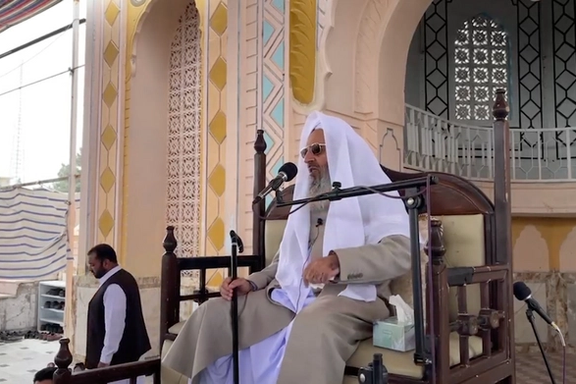No Need For Referendum When Results Are Obvious – Sunni Leader

Iran’s Sunni leader Mowlavi Abdolhamid said there is no hope for a referendum when its results are obvious in the hands of the corrupt regime.

Iran’s Sunni leader Mowlavi Abdolhamid said there is no hope for a referendum when its results are obvious in the hands of the corrupt regime.
Abdolhamid made the remarks during his Friday prayer sermons before more anti-regime rallies in his province, Zahedan, broke out for the 30th week in a row.
Abdolhamid was among the first regime critics whocalled for a referendum about 50 days into the current wave of protests following the death in custody of 22-year-old Mahsa Amini in September.
At the time, he said: “Now, the majority of people are unhappy. If you don't agree, hold a referendum with the presence of international observers and accept the result.”
By calling for a free referendum to decide the future form of government, Abdolhamid echoed a long-held demand by critics and opponents of the Islamic Republic. However, without international monitoring, the results would be clear and in favor only of the regime.
During his Friday sermon, Abdolhamid pointed to the obvious corruption which would ensue over any elections held in Iran. He said: “The result of a referendum is clear and the solution to the problems is to listen to the people's demands.”
He also touched on the renewed wave of strikes by workers of the country’s factories, particularly by the energy sector’s contract-workers, saying that the national currency has been devaluing and people face serious problems while authorities make no moves.
Since last Saturday, strikes by Iranian energy, petrochemicals and steel workers have been gaining momentum as new firms are joining the nationwide industrial action. On Friday, a government official said four thousand striking workers are being replacedas the action is spreading to dozens of plants.
“Every regime in the world, Islamic or non-Islamic, must stand with its people, and no regime will survive by the force of arms,” stressed Abdolhamid, who is seen as the unofficial voice of the country’s Sunni community – about 10% of Iran’s population of 88 million.
Addressing the military forces of the country, he warned the armed forces of the strength of the masses after months of violent repression against civilian protesters: "My advice to the armed forces is not to stand against the people. You are the sons of the nation, and if the people want change from you, change yourselves.”
Khamenei’s refusal to open a referendum has angered many. During a meeting with a cherrypicked number of students earlier in the month, Khamenei questioned the viability of a referendum and dismissed the possibility of a referendum, saying that people are not capable of making decisions.
In a mockery of the long established democratic political process, the Supreme Leader made the wild statement: “Is it possible to hold a referendum on various issues in the country? Where in the world do they do this? Do all the people who have to participate in the referendum have the ability to analyze that issue?”
Voices calling for a referendum include former regime insider and current opposition figure Mir-Hossein Mousavi, who was a presidential candidate in 2009 and has been under house arrest since 2011, as well as former president Hassan Rouhani. They have cited key issues such as a new constitution and the nuclear program.
Article 59 of the Constitution of the Islamic Republic, which was ironically approved by a referendum after the Islamic Revolution of 1979, stipulates that in extremely important economic, political, social, and cultural matters, the functions of the legislature may be exercised through direct recourse to popular vote by holding a national referendum. It must be approved by two-thirds of the members of parliament according to the Constitution.
Last week, the government’s official daily, Iran, published a commentary about the calls for a referendum, quashing its practicality and insisting that "issues related to national security can be very sensitive”, warning that “holding referendums on these issues may lead to unpredictable and dangerous results”.